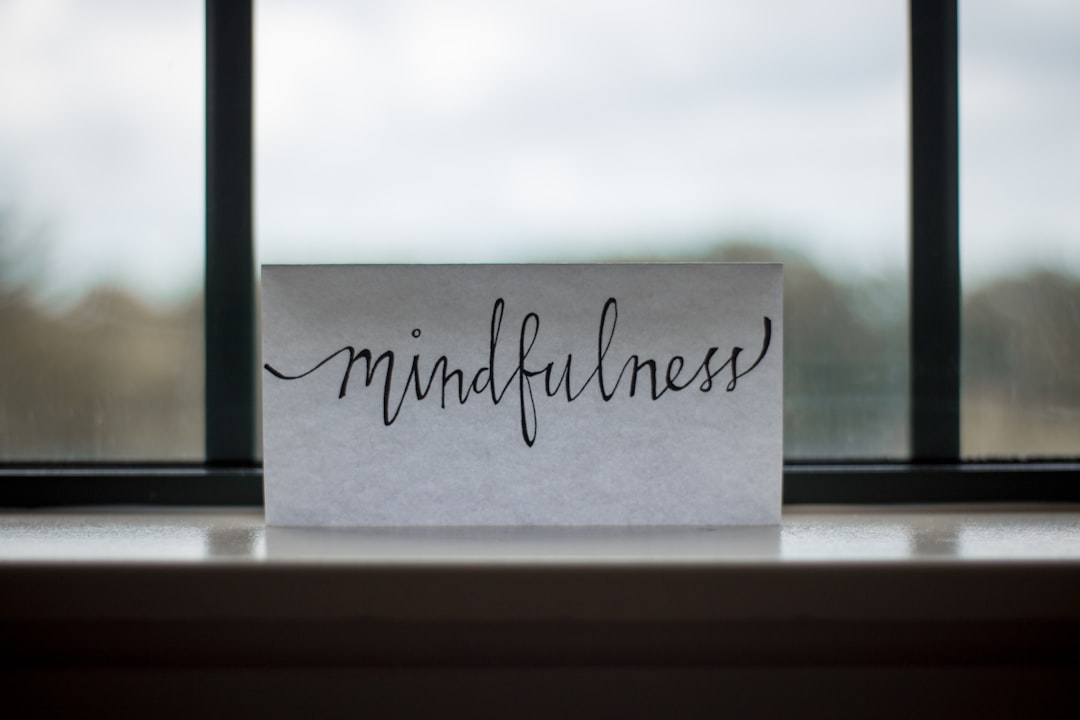Introduction
In today's fast-paced world, we're constantly bombarded with information on mindfulness and its benefits for mental health. However, less often do we hear about the downsides of overusing this practice or the insidious effects of overthinking. While mindfulness is meant to help us focus and embrace the present, too much focus can actually lead to stress and anxiety. Similarly, constantly ruminating over life's challenges can negatively impact our well-being. Finding a healthy balance is key to maintaining peace.
Understanding Mindfulness and Overthinking
 Image courtesy: Unsplash
Image courtesy: Unsplash
Definition and Purpose of Mindfulness
Let's kick things off with mindfulness. At its core, mindfulness is the practice of being present in the moment without judgment. Think of it as taking a mental breath to notice your thoughts, feelings, and surroundings without getting swept away by them. The purpose? To help us cultivate a deeper awareness of ourselves and the world around us, fostering peace and clarity in our often hectic lives. It's like pressing pause on a busy life track, allowing us to reset and regroup.
Common Triggers of Overthinking
We all know the familiar tune of overthinking — those endless loops of thoughts that can keep us awake at night. Several factors can kickstart this merry-go-round in our minds. Situational triggers like relationship conflicts or big life decisions can set off overthinking. Personal insecurities and the fear of making mistakes can also fuel these unending thoughts. Even the desire to control future outcomes can prompt excessive rumination. The trick is recognizing when you're on that hamster wheel of thoughts and gently stepping off.
Intersection of Mindfulness and Overthinking
Now, here's where it gets fascinating. While mindfulness aims to bring calm and clarity, it's possible to veer into overthinking territory when not practiced correctly. You might find yourself obsessing over being present or worrying about whether you're achieving 'perfect mindfulness.' Ironically, mindfulness itself can become another source of stress if we start overanalyzing whether we’re doing it ‘right.’ Imagine the irony: stressing about not being stressed!
Negative Effects of Mindfulness Misuse
Increased Anxiety and Stress
You'd think practicing mindfulness would solely reduce anxiety, right? Well, not exactly. In some cases, mindfulness misuse can ramp up levels of stress and anxiety. When the practice becomes another chore on your to-do list, it defies the very purpose it’s supposed to serve. Instead of providing relief, it might have you feeling guilty for not doing it ‘right’ or often enough. This anxiety loop negates the serene retreat mindfulness intends to offer.
Disconnection and Isolation
Mindfulness, when taken to extremes or misunderstood, can inadvertently encourage detachment from our surroundings. The idea is to observe without attachment, but some may interpret this as withdrawal. Individuals might begin to retreat into their own mental bubble, prioritizing internal focus over external engagement. This can lead to feelings of disconnection and isolation, where people might struggle to truly connect with others, thinking they must always be in their 'mindful zone.'
Emotional Suppression
There's also a risk of using mindfulness as a way to suppress emotions rather than face them. Instead of being an observer of our emotional states, mindfulness can sometimes be misapplied as a tool to avoid confronting difficult feelings. People might confuse mindful awareness with emotional suppression, thinking they should brush off negative emotions rather than acknowledge and process them. The result? An accumulation of unresolved emotions that can bubble up unexpectedly, similar to shaking a soda bottle and then opening it — a fizzy, messy explosion of feelings.
In our quest to master mindfulness and avoid overthinking, it's essential to strike a healthy balance, understanding that it's okay to feel and think but also to let go when need be. Stay tuned for part two, where we’ll dive into practical tips for reducing overthinking and utilizing mindfulness in ways that genuinely support mental health rather than hinder it. 🧘♂️🌿
Harmful Impacts of Overthinking on Health
Overthinking might seem like a harmless habit or even a constructive one. After all, who doesn't want to think things through, right? However, when left unchecked, overthinking can sneakily spiral into a cycle that adversely affects our mental and physical health. Let's dive into some major ways overthinking can negatively impact us.
Mental Exhaustion and Fatigue
Ever feel like your brain just ran a marathon? That's mental exhaustion, and it's often the byproduct of overthinking. Constantly analyzing, deliberating, and worrying over things can drain your mental energy. It's like having multiple tabs open on your computer that keep playing videos on loop, causing your system to glitch due to overload. Mental fatigue can make you feel perpetually tired, and this can lead to a foggy brain, poor concentration, and decreased productivity, leaving you feeling overwhelmed and stuck in a mental rut.
Decision Paralysis
Ever spent an inordinate amount of time deciding on trivial matters like what to eat for lunch? You're not alone. Overthinking often leads to decision paralysis, where you become so caught up in weighing every possible outcome that you become unable to make any decision at all. It's akin to standing at a crossroad, frozen, as you debate endlessly which path to take. The fear of making the wrong choice can be mentally suffocating, leading to missed opportunities and increased stress.
Sleep Disruptions
Just as you're about to drift off to sleep, your mind starts racing: "Did I reply to that email?" "What if I made a mistake in the presentation?" These nocturnal thought spirals are emblematic of overthinking. When your brain enters overdrive at bedtime, it can become challenging to fall and stay asleep. Sleep disruptions wreak havoc on your body's natural rhythms, causing irritability, mood swings, and even cognitive impairments the following day. Lack of quality sleep not only affects your mental health but can also lead to several physical health issues, creating a detrimental cycle.
Strategies to Mitigate the Effects
 Image courtesy: Unsplash
Image courtesy: Unsplash
While recognizing the detrimental effects of overthinking is the first step, finding ways to ease these impacts and regain control over your thoughts is essential. The good news? There are several strategies you can employ to help kick overthinking to the curb and help mindfulness work for you, not against you.
Setting Healthy Boundaries with Mindfulness
Mindfulness is a fantastic tool—when used in moderation. Sometimes, though, its misuse can amplify overthinking as we hyper-focus on our internal states. To prevent this, establishing clear boundaries is key. Implement mindfulness practices that emphasize letting go rather than holding on. Techniques like guided meditation sessions that encourage you to notice thoughts and allow them to pass without over-analysis can be incredibly beneficial. Remember, mindfulness doesn't mean dissecting every thought; instead, it should encourage awareness without judgment.
Techniques to Break the Overthinking Cycle
To disrupt the cycle of overthinking, consider incorporating these practical techniques into your daily life:
- Journaling: Write down your thoughts to gain perspective. Often, seeing your fears and worries on paper makes them less intimidating.
- Scheduled Worry Time: Dedicate a specific time of day to worry. Set a timer, allow yourself 15 minutes to ruminate, then make an effort to put those thoughts aside.
- Physical Activity: Engage in activities that shift your focus from your mind to your body—exercise, dance, or go for a walk. Physical movement can be a powerful way to break overthinking patterns.
Incorporating Balance and Moderation
Balance is key to maintaining a healthy relationship with your thoughts and habits. It's crucial to strike a balance where mindfulness and introspection contribute positively to your well-being instead of overshadowing it. Embrace moderation by allocating time for mindfulness practices alongside enjoyable activities that make you forget your worries, whether that's savoring a hobby, spending time with loved ones, or simply indulging in laughter. By consciously creating a diversified routine, you can ensure that there's a content mix of introspection and carefree living.
Remember, it's completely normal to mull over things from time to time. But when it starts affecting your health, it's time for a change. By implementing these strategies, you can reclaim your mental space and foster a healthier, more balanced approach to dealing with life’s ups and downs.
Conclusion
In a world buzzing with constant activity, our minds often bear the brunt of the overload. While mindfulness can be a beneficial practice, it's essential to use it wisely to avoid turning it into a stressor. Overthinking can lead to anxiety if left unchecked. Recognizing these patterns and implementing techniques such as setting boundaries, practicing gratitude, and seeking support can make all the difference in keeping our mental health in check. Remember, balance is key to thriving in both practice and life!
The Negative Impact of Mindfulness Misuse and Overthinking on Health and How to Mitigate It
Discover the harmful effects of excessive mindfulness and overthinking on your health and learn how to reduce them.
Discover how mindfulness and overthinking can negatively impact your health and learn practical tips to reduce stress and improve your well-being! Find out more in our latest blog post. 🌿💆♀️
#MindfulnessMisuse #OverthinkingEffects #MentalHealth #StressRelief #WellBeing #ReduceOverthinking 🌟
